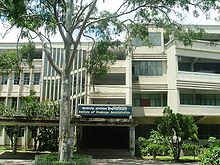Institute of Business Administration, University of Dhaka
 IBA Building, Dhaka | |
| Type | Semi-autonomous Institute under University of Dhaka |
|---|---|
| Established | 1966 |
| Director | Professor Mohammad Abdul Momen |
Academic staff | 39 |
| Undergraduates | 480 |
| Postgraduates | 200 |
| Location | , 23°44′06″N 90°23′37″E / 23.735015°N 90.393582°E[1] |
| Campus | Urban, located at Shahbag |
| Website | iba-du |
The Institute of Business Administration (Template:Lang-bn) of the University of Dhaka, commonly known as IBA, is a business school located in Dhaka, Bangladesh.
History
IBA was founded in 1966 in collaboration with Indiana University, Bloomington, USA, under a Ford Foundation Financial Assistance Program with the objective of providing professional training to create future business leaders. The founder-director of IBA is Professor M. Safiullah.[2] IBA began by launching its flagship MBA program. In the 1970s, the MPhil and PhD programs were introduced. The BBA program was started in 1993 at the institute.[3] In 2007, the Executive MBA program was launched to cater to the growing demand for quality education among mid-career executives.[4]
Administration
Board of Governors
IBA is governed by the fourth Statute of the University of Dhaka and functions within the broad framework of policies, rules and regulations of the University.[citation needed]
Academic Board
The Academic Board of the Institute reviews the academic programs. All Professors and Associate Professors of IBA are members of this Board and the Director of IBA is the Chairperson of the board. The other members are the Dean of the Faculty of Business Studies and the Chairmen of the Departments thereunder. There is also a provision of including nominated members from the academic and business communities.[citation needed]
Co-ordination and Development (C&D) Committee
The Coordination and Development Committee consists of the top one-third of the total number of teachers of the institute. It is responsible for, among other things, planning further development of the Institute in the areas of academic and research programs, and recruitment and training of teachers.[citation needed]
Academic Committee
The Academic Committee is composed of all the teachers of the institute. The Committee provides operational guidance to the academic programs of the institute. It deals with admission of students, curricula, examinations, teaching and co-curricular activities, etc.[citation needed]
Academic programs
- BBA Program
- MBA Program
- PhD Program
- MPhil Program
- Executive MBA
- Doctor of Business Administration(DBA)
Management Development Programs (MDP)
The Management Development Program of the institute is geared towards helping individual managers and organizations augment their management development efforts. The services provided by the program include management training, seminars, workshops and executive forums.[citation needed]
The following courses are regularly been offered by MDP:
- ACBA: Advanced Certificate in Business Administration (A six month long Joint Program by IBA, DU & AMDISA, a SAARC-recognized body)
- AFNA: Accounting For Non-Accountants
- CBSI: Competitive Business Strategy & Innovation
- FNM: Finance For Non-Finance Managers
- HRMC: Human Resource Management Competencies
- LCMC: Leadership Certificate in Managerial Communication
- MCFM: Marketing Competencies For Managers
- MSSP: Marketing Skills For Service Professionals
- RMC: Relationship Marketing Competencies
The MDP also provides some two-day (weekend) short courses on following topics:
- Credit Risk Management (CRM)
- Integrated Marketing Communication (IMC)
- Leadership & Change Management
- Sales & Salesmanship Excellence
- Supply Chain Management
Campus
IBA has its own premises within the campus of the University of Dhaka. The four-storied main building contains 65,000 square feet (6,000 m2) of floor space.[5] To cater to the unique needs of business and society, the institute has created some special centres such as the Center for Management Research and Publications(CMRP), IBA Computer Center (IBACC), Development and Policy Research Center(DPRC), Center for Women's Studies (CWS), Center for Entrepreneurship and Small Business Development (CESBD), IBA Case Development Center (ICDC), Center for Population Management and Research (CPMR), and IBA Environment Development Center (IEDC). Each Center is headed by a Chairperson chosen from the IBA faculty members.[citation needed]
Accommodation
IBA students coming from outside Dhaka can reside in a hostel, situated outside campus, on Green Road in Dhaka. A warden, appointed by the faculty members of IBA, looks after the proper functioning of the student hostel. IBA Professors' Quarters is adjacent to the IBA Hostel at the same location.[citation needed]
Notable faculty
- Muzaffar Ahmed, economist and Ekushey Padak laureate academician
- Imran Rahman, academician and musician
- Salimullah Khan, intellectual and academician.
- Md. Tafazzul Islam, former Chief Justice of Bangladesh.
- Hafiz Siddiqi, former VC of North South University.
Notable alumni
This article's list of alumni may not follow Wikipedia's verifiability policy. (February 2021) |
- Ahsan Adelur Rahman, politician
- Muhammed Aziz Khan, founder and chairman of the Summit Group[6]
- Tahsan Rahman Khan, actor, singer, songwriter and former lecturer of BRAC University
- Shahriar Alam, politician, state minister for foreign affairs, Bangladesh
- Syed Alamgir, businessman[7]
- Nazmul Hasan Papon, a member of parliament and current president of Bangladesh Cricket Board
- Mahmudur Rahman, one of the owners and acting editor of Bengali daily newspapers, Amar Desh
- Mohammed Shamsul Hoque Bhuyan, businessman and member of parliament.
- Ayman Sadiq, Founder at 10 Minute School.
References
- ^ "Wikimapia - Let's describe the whole world!". wikimapia.org.
- ^ Staff. "ABOUT IBA". du.ac.bd. University of Dhaka. Retrieved 15 June 2015.
- ^ Chowdhury, Asrar. "Studying Economics: Then and Now". The Daily Star. Retrieved 15 June 2015.
- ^ "IBA/University of Dhaka". iba-du.edu.
- ^ "IBA Website: About IBA". Archived from the original on 27 March 2005. Retrieved 10 April 2005.
- ^ "Introducing the Directors". Summit Power. Archived from the original on 24 April 2016. Retrieved 9 April 2016.
- ^ Chowdhury, Dwoha (25 November 2020). "Adaptability is the key to success". The Daily Star.
